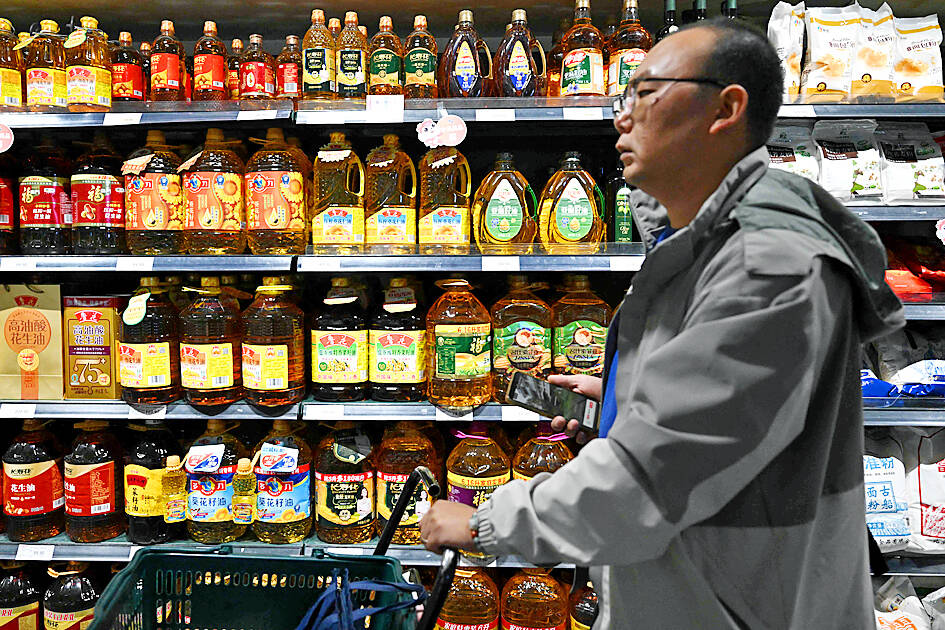Chinese exports of used cooking oil to the US were already in retreat well before US President Donald Trump chose them as the latest flashpoint in his trade war with Beijing.
Trump has landed on purchases of cooking oil as a possible weapon to counter China’s refusal to buy US soybeans. Used cooking oil is a feedstock commonly employed to make biofuels. However, soybeans remain a much more valuable commodity, and it is unlikely that ending the US-China trade in used cooking oil would have a dramatic impact on buyers or sellers.
Having hit a record 1.27 million tonnes — worth US$1.2 billion — last year, Chinese sales of processed edible oils to the US, mainly used cooking oil, have plunged this year after Beijing scrapped tax relief on exports. Over the first seven months, sales were 387,000 tonnes versus 684,000 tonnes in the same period last year, US Department of Agriculture data showed.

Photo: AFP
By comparison, Chinese soybean purchases from the US last year totaled about US$12.6 billion. Still, the US was China’s top destination for used cooking oil last year, accounting for about 43 percent of its exports, the US department said.
Chinese shipments to the US have fallen, with some redirected to the EU and others to domestic producers of sustainable aviation fuel, said Dan Mackay, an analyst in Singapore at price reporting agency Quantum Commodity Intelligence.
Waning demand from the US has already been priced in by the market, he said, adding that export offers for Chinese used cooking oil cargoes are unchanged since Trump’s post threatening to end the trade.
China’s exports of unused cooking oil to the US began to surge in 2023, as US biofuel producers snapped up cheap supplies to capitalize on the green incentives of former US president Joe Biden’s administration. The increase also followed a probe by the EU into Chinese shipments after local competitors complained about artificially low prices.
That backlash spread to the US, where the biggest soybean processors accused China of undercutting US crops used for biofuels. Beijing’s removal of tax breaks on overseas sales of used cooking oil on Dec. 1 last year further shrank its appeal as an export.
It means the direct impact of a ban on China and the US would be limited. Chinese traders could see “short-term pressure as they redirect volumes to Europe or deal with weaker prices and higher inventories,” said Kang Wei Cheang, an agricultural broker at StoneX Group Inc in Singapore.
In the US, the supply of low-carbon feedstock could tighten, he said.
Soybean oil futures on the Chicago Board of Trade did respond positively to Trump’s threat, adding as much as 1.7 percent before paring gains.
Overseas markets for other vegetable oils, including palm oil from Southeast Asia, are also likely to come under some pressure from the US president’s protectionist tilt.
Futures in Kuala Lumpur dropped as much as 0.6 percent before recovering most of those losses.
“It is bearish on palm oil, but bullish for local US soybean oil,” said Rajesh Modi, a trader at Sprint Exim Pte in Singapore.

Taiwan’s rapidly aging population is fueling a sharp increase in homes occupied solely by elderly people, a trend that is reshaping the nation’s housing market and social fabric, real-estate brokers said yesterday. About 850,000 residences were occupied by elderly people in the first quarter, including 655,000 that housed only one resident, the Ministry of the Interior said. The figures have nearly doubled from a decade earlier, Great Home Realty Co (大家房屋) said, as people aged 65 and older now make up 20.8 percent of the population. “The so-called silver tsunami represents more than just a demographic shift — it could fundamentally redefine the

The US government on Wednesday sanctioned more than two dozen companies in China, Turkey and the United Arab Emirates, including offshoots of a US chip firm, accusing the businesses of providing illicit support to Iran’s military or proxies. The US Department of Commerce included two subsidiaries of US-based chip distributor Arrow Electronics Inc (艾睿電子) on its so-called entity list published on the federal register for facilitating purchases by Iran’s proxies of US tech. Arrow spokesman John Hourigan said that the subsidiaries have been operating in full compliance with US export control regulations and his company is discussing with the US Bureau of

Businesses across the global semiconductor supply chain are bracing themselves for disruptions from an escalating trade war, after China imposed curbs on rare earth mineral exports and the US responded with additional tariffs and restrictions on software sales to the Asian nation. China’s restrictions, the most targeted move yet to limit supplies of rare earth materials, represent the first major attempt by Beijing to exercise long-arm jurisdiction over foreign companies to target the semiconductor industry, threatening to stall the chips powering the artificial intelligence (AI) boom. They prompted US President Donald Trump on Friday to announce that he would impose an additional

China Airlines Ltd (CAL, 中華航空) said it expects peak season effects in the fourth quarter to continue to boost demand for passenger flights and cargo services, after reporting its second-highest-ever September sales on Monday. The carrier said it posted NT$15.88 billion (US$517 million) in consolidated sales last month, trailing only September last year’s NT$16.01 billion. Last month, CAL generated NT$8.77 billion from its passenger flights and NT$5.37 billion from cargo services, it said. In the first nine months of this year, the carrier posted NT$154.93 billion in cumulative sales, up 2.62 percent from a year earlier, marking the second-highest level for the January-September